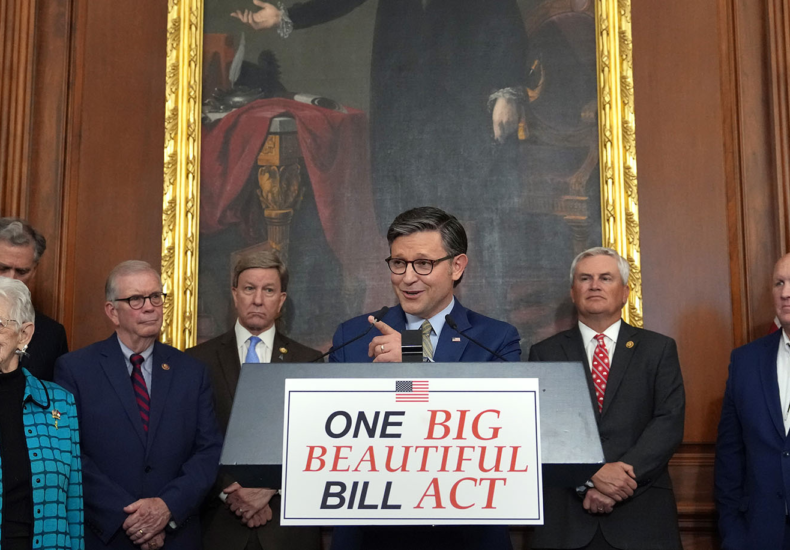
Faith leaders decy ‘big beautiful bill’ as immoral and un-Christian – Baptist News Global
NewsMark Wingfield | May 27, 2025
Apart from evangelicals and die-hard Trump supporters, America’s religious leaders find the president’s “big beautiful bill” adopted by the U.S. House of Representatives to be immoral, unkind and un-Christian.
“Page for page, the ‘big beautiful bill’ championed by Mr. Trump and his Congressional cronies is literally the antithesis of the gospel. Any pastor who tells you otherwise certainly isn’t working for God,” said BNG columnist Basil Dannebohm, a political consultant and former Republican elected official.
Basil Dannebohm
“So many so-called ‘devout’ Christians among us prattled on for years about false prophets and antichrist figures, only to end up adoring one. Jesus would call them ‘blind fools.’ I simply call them what they are: the MAGA cult.”
While fulfilling many of President Donald Trump’s campaign promises, the bill would add $3.8 trillion to the federal debt. Income for the poorest 10% of U.S. households would be reduced, and the wealthiest 10% would see an increase in income. About 8.6 million people would lose health insurance as a result of the cuts, and 3 million people a month would stop receiving SNAP.
That’s according to the nonpartisan Congressional Budget Office, whose assessment has not been generally challenged. The facts of the budget plan are clear; whether this plan is moral or not is what’s debated.
Hakeem Jeffries
House Minority Leader Hakeem Jeffries said: “Jesus talks about the importance of standing up for the least, the lost, the left behind, the poor, the sick, the afflicted, the homeless, the people who are confined, strangers in a foreign land. It cannot be the case that one goes to synagogue or goes to the mosque — or one goes to church, as I do — but one goes to church to pray on Sunday and then comes to Washington, D.C., to prey on the American people the rest of the week.”
The Catholic Church, the Episcopal Church and the Lutheran Church are among those urging senators not to accept the budget as adopted by the House.
“As Episcopalians we believe the government should seek economic justice and protect the most vulnerable communities, the poor, the hungry, the sick and the marginalized,” said the Episcopal Church’s Office of Government relations in a statement.
Michael Sean Winters
“This ‘big beautiful bill’ is big, but it isn’t beautiful. It is unfair, cutting programs that help struggling families to provide tax cuts to rich people who don’t even need it,” wrote Michael Sean Winters for National Catholic Reporter. “It does nothing to help people struggling with higher prices for gas and groceries. It makes the deficit larger. There is no economic problem that the nation faces that will not be made worse by this bill.”
His words echoed the concerns of Catholic bishops and other church leaders who praised only the parts of the bill that limit access to abortion services.
Clint Schnekloth
“This is a moment that demands moral clarity and public pressure,” wrote Lutheran pastor Clint Schnekloth. “Yes, calls to Congress do make a difference. Lawmakers tally them like a kind of ethical temperature check. Will we stay quiet while the heat rises on the vulnerable? Or will we act?
“I write this not just as someone concerned about policy, but as a pastor shaped by a tradition that believes budgets are moral documents. What we fund and what we cut tells the truth about what we value, and whom we are willing to sacrifice.
“In the Lutheran tradition (and across many strands of Christian thought), we are called to protect the poor, lift up the lowly and build systems that ensure what the Evangelical Lutheran Church in America in its social statements calls ‘sufficient, sustainable livelihood for all.’ That’s not just poetic language. It’s a moral claim. It means we must design economies and public systems that support the basic dignity of everyone, not just the well-connected or the lucky.”
Adam Russell Taylor
Sojourners President Adam Russell Taylor warned this bill “serves as a thermometer, and the reading we’re getting back is telling us that the United States of America is suffering from a dangerous fever.”
Federal budgets are “moral documents,” he said. “Choices about where the government should spend money and where it should cut spending say a great deal about our nation’s moral values. Just as families make spending choices by balancing their needs and wants, our federal budget reflects who and what we value. It has significant consequences for who goes hungry, who has access to medical care, and who can travel safely, not to mention how many bombs there are for drone strikes or how much rebar for border walls. Viewed in these moral terms, the ‘big beautiful bill’ is a big, ugly bill that inverts biblical values.”
Meanwhile, the White House took a victory lap after House passage and issued its own declaration: “President Donald J. Trump’s One, Big, Beautiful Bill — a once-in-a-generation opportunity to cement an America First agenda of prosperity, opportunity, and security into law — is one step closer to the finish line following its passage by the House of Representatives.”
The White House statement was accompanied by endorsements of the bill by a variety of business and political leaders but did not quote a single religious leader.
Mike Johnson
Speaker of the House Mike Johnson, a Southern Baptist, told RNS he had been praying all week for the bill’s passage. Showing a reporter the House “prayer room,” he explained: “Been here a lot this week, right there on my knees. Just praying. … That’s what the founders did.”
Greg Adams, a Baylor University educated social worker who attends Second Presbyterian Church in Little Rock, Ark., posted a lengthy review of the bill on Facebook. His Arkansas district is represented in Congress by Republican French Hill, chairman of the House Committee on Financial Services.
Greg Adams
Hill boasted after House passage: “Today House Republicans delivered on our mandate to pass a bill that strengthens the tax code, secures our border and maintains America’s energy dominance. For too long, government spending has been a one-way road in the wrong direction. I am proud of the work of my colleagues and I on Financial Services Committee did to contribute to the meaningful spending reductions in this bill. The American people voted for real change, and House Republicans delivered today by passing President Trump’s One, Big, Beautiful Bill.”
As a constituent, Adams wrote to Hill of his “deep disappointment” with the bill that “will cause great harm for many in your district and those in my community.”
Earlier, Hill voted to repeal the Affordable Care Act, which would have taken away healthcare for millions of Americans, including Hill’s adult son who has a life-threatening chronic disease.
And now, he wrote, “while finding cost-savings for programs which serve the most needy, the financial concerns of the wealthy were protected, and the budget deficit will be greatly increased. … Bluntly put, if the bill you supported becomes law, more people will die from preventable causes — including more Arkansans in your district. More of my neighbors will die, more funerals, and more grieving families. As a mental health professional who works in grief support, this reality is greatly disturbing.”
Graph by G. Elliott Morris
Data journalist and book author G. Elliott Morris published a widely read Substack column tearing apart the House bill. The headline: “Republicans Want You to Pay More for Less.”
“Donald Trump’s policies are punishing the poor, rewarding the rich, inflating prices and shrinking revenues. And for what?” he asked.Bottom of Form
His summary: “The bill will decrease the effective after-tax income of poor families, increase the income of the wealthiest Americans, and increase the size of the federal budget deficit by trillions of dollars.”
And despite narrow passage on the House in the wee hours of a Sunday morning, the Republican bill is not popular with voters. Morris cited a May Strength In Numbers/Verasight poll that found only 14% of Americans approve of cutting Medicaid to finance tax cuts. And according to Data for Progress, “there is no congressional district in America where more than 15% of voters support cutting back on SNAP,” the program that helps feed hungry Americans.
Morris concludes: “Americans think this is a bad bill. And after taking a hard look at it, I think so, too.”
He gives a detailed breakdown of various aspects of the plan, but the nutshell is this: “The Republicans in government are asking you to let them take food out of the literal mouths of babes, in order to increase the pay of the top 0.1% of Americans by $389,000. All while pumping an additional $150 billion into the Pentagon and increasing our budget deficit by $3.8 trillion over the next decade.
“In other words, by decreasing the amount of tax revenue it gathers from the ultra-rich, decreasing the transfers it makes to the poor, and increasing its overall spending, Republicans are asking middle-income and poor families to shoulder a much larger share of the federal deficit — all while they get less from the government. They are asking you, in summary, to pay more for less.”
But wait, there’s more
The bill contains much more than economic policy, and that also has drawn criticism on moral grounds.
One buried provision “would severely restrict federal courts’ authority to hold government officials in contempt if they violate judicial orders,” according to Campaign Legal Center. “A court’s ability to hold bad actors in contempt is a vital enforcement power that judges can use to compel compliance with their rulings.”
This matters, the group explains, because “courts have already ruled at least 170 times against the Trump administration, including a preliminary injunction sought by CLC that halted Trump’s unconstitutional attempt to change the rules for federal elections. In response to many of these rulings, the president has resisted compliance and waged intimidation campaigns targeting the judges responsible. In light of all this, the House bill seems squarely and unacceptably focused on shielding the Trump administration from accountability when it breaks the law.”
Also, the final House budget bill includes a private school voucher program. This bill aims to fund private school scholarships through a tax credit and is designed to allow donors to reduce their tax liability by donating to nonprofits that grant scholarships.
BNG previously reported the bill creates a national school voucher program that “will make the rich richer and further marginalize students based on religious, economic and disability status.”
American Prospect reported on at least 10 hidden measures in the House budget bill, including eliminating a direct-file provision for individual taxpayers to avoid tax preparation fees, spending $45 billion to build more immigration jails and allowing indefinite detention of immigrant children, giving the administration the power to define nonprofits as “terrorist-supporting organizations” and expedite ending their tax-exempt status.
Related articles:
‘Big beautiful bill’ creates school voucher program that benefits the rich
Religious liberty groups oppose federal school voucher plan
The Ten Commandments and the tyranny of minority rule | Analysis by Mara Richards Bim

(123rf.com)
• Stuck in the Middle With You
• Highest Power: Church + State
• Change-making Conversations
(123rf.com)
— A BNG interview series on the 2024 election and the Church
News
Opinion
News
Opinion
© 2025 Baptist News Global. All rights reserved.
Want to share a story? We hope you will! Read our republishing, terms of use and privacy policies here.
You may also like
You may be interested
Hello world!
Welcome to WordPress. This is your first post. Edit or...
Trump Administration Live Updates: New Orders Will Escalate Immigration Crackdown, White House Says – The New York Times
Trump AdministrationExecutive orders: President Trump will sign two new executive...
Leavitt, Homan tout immigration policy at White House press briefing – NewsNation
Leavitt, Homan tout immigration policy at White House press briefing NewsNationsource

Leave a Reply